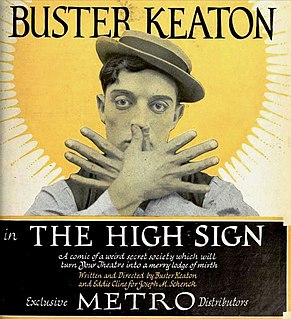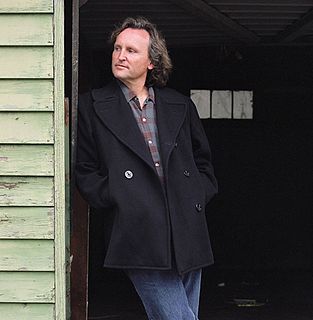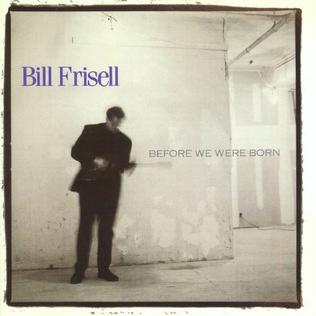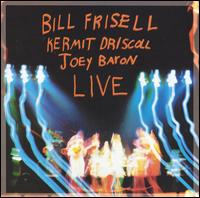
William Richard Frisell is an American jazz guitarist, composer and arranger. Frisell first came to prominence at ECM Records in the 1980s, as both a session player and a leader. He went on to work in a variety of contexts, notably as a participant in the Downtown Scene in New York City where he formed a long working relationship with composer and saxophonist John Zorn. He was also a longtime member of veteran drummer Paul Motian's groups from the early 1980s until 2011. Since the late 1990’s, Frisell's output as a bandleader has also integrated prominent elements of folk, country, rock ‘n’ roll and Americana.
Kermit Driscoll is an American jazz bassist. He is known for his long association with guitarist Bill Frisell.
Hans Wendl is a producer. He began his career in the music business with the record label ECM Records in his hometown of Munich in the mid-1970s and was associated with the German label for twelve years before moving to the United States in 1986. He was also director of the Gramavision Records label for Rykodisc for three years during the mid-1990s.

The High Sign is a 1921 two-reel silent comedy film starring Buster Keaton, and written and directed by Keaton and Edward F. Cline. Its runtime is 21 minutes. Although One Week (1920) was Keaton's first independent film short released, The High Sign was the first one made. Disappointed with the result, Keaton shelved it and the film wasn't released until the following year. The title refers to the secret hand signal used by the film's underworld gang.

Filmworks VII: Cynical Hysterie Hour is a 1989 album by John Zorn featuring music written for a series of Japanese animated shorts that were created by Kiriko Kubo. It features Zorn's first music for cartoons and was originally released on the Japanese Sony label in limited numbers. In late 1996 Zorn finally attained the rights for his music and remastered and re-released the album on his own label, Tzadik, in 1997.

Grace Under Pressure is a studio album by jazz guitarist John Scofield. It features fellow guitarist Bill Frisell, bassist Charlie Haden and drummer Joey Baron. Five of the ten tracks also feature a brass trio led by Randy Brecker.

Lee Townsend is an American independent music producer, curator, artist manager and co-owner of Songtone, specializing in recordings of singer-songwriters, contemporary composers, improvising musicians, and cross-cultural musical collaborations. He is also a psychotherapist in private practice in the San Francisco Bay Area.

Lookout for Hope is the third album by Bill Frisell, released in 1988 on ECM. It contains performances by Frisell, cellist Hank Roberts, bassist Kermit Driscoll and drummer Joey Baron.

Before We Were Born is the first album by Bill Frisell to be released on the Elektra Nonesuch label. It was released in 1989 and features performances by Frisell, cellist Hank Roberts, bassist Kermit Driscoll and drummer Joey Baron. Guests include guitarist Arto Lindsay, keyboardist Peter Scherer, alto saxophonist Julius Hemphill and baritone saxophonist Doug Wieselman.

Is That You? is the second album by Bill Frisell to be released on the Elektra Nonesuch label. It was released in 1990 and features performances by Frisell, keyboardist Wayne Horvitz and drummer Joey Baron, who were all members of Naked City at this time.

Where in the World? is the third album by Bill Frisell to be released on the Elektra Nonesuch label. It was released in 1991 and features performances by Frisell, cellist Hank Roberts, bassist Kermit Driscoll and drummer Joey Baron.

In 1992, Have a Little Faith was the fourth Bill Frisell album released by Elektra Nonesuch, featuring performances by Frisell, clarinetist Don Byron, bassist Kermit Driscoll, accordion player Guy Klucevsek and drummer Joey Baron. The album covers a range of American classical and popular music.

This Land is the fifth album by Bill Frisell to be released on the Elektra Nonesuch label. It was released in 1994 and features performances by Frisell, alto saxophonist Billy Drewes, trombonist Curtis Fowlkes, clarinetist Don Byron, bassist Kermit Driscoll and drummer Joey Baron.

The High Sign/One Week: Music for the Films of Buster Keaton is the seventh album by guitarist Bill Frisell to be released on the Elektra Nonesuch label. It was released in 1995 and features performances by Frisell, bassist Kermit Driscoll and drummer Joey Baron. The album is designed as accompaniment to Buster Keaton's first two silent film classics, The High Sign (1921) and One Week (1920). It was released at the same time as another album by Frisell of Keaton soundtracks, Go West: Music for the Films of Buster Keaton (1995).

Quartet is the eighth album by Bill Frisell to be released on the Elektra Nonesuch label. It was released in 1996 and features performances by Frisell, trumpeter Ron Miles, trombonist Curtis Fowlkes and violinist and tuba player Eyvind Kang. Tracks 1, 5, 6, 7, 9, and 12 are from Tales From the Far Side (1994), an animated television special created by Gary Larson. Tracks 3 and 13 are from the Italian film La scuola (1995) directed by Daniele Luchetti. Tracks 4 and 10 were written for the Buster Keaton film Convict 13 (1920).

The Intercontinentals is the 16th album by Bill Frisell to be released on the Elektra Nonesuch label. It was released in 2003 and features performances by Frisell, Sidiki Camara, Vinicius Cantuaria, Christos Govetas, Greg Leisz and Jenny Scheinman.

Live is a live album by guitarist Bill Frisell released on the Gramavision label. It was released in 1995 and features a performance by Frisell, bassist Kermit Driscoll and drummer Joey Baron recorded in 1991 at Terceros Encuentros de Nueva Musica, Teatro Lope de Vega, Seville, Spain.
The Rats & People Motion Picture Orchestra is an ensemble of composers and musicians based in St. Louis, Missouri. The ensemble composes and performs original scores to accompany films of the Silent Era, and composes and records soundtrack music for contemporary films.

David Johansen and the Harry Smiths is a 2000 album that David Johansen released with the "Harry Smiths". Johansen created the album following a folk scene that was taking place in the late 1990s in New York City clubs. Inspired by the 1997 reissue of musicologist Harry Everett Smith's Anthology of American Folk Music, Johansen named his band "the Harry Smiths" and recorded and performed songs from, or inspired by, the Anthology. The Harry Smiths band included long-time Johansen associate Brian Koonin on guitar and mandolin, with Larry Saltzman also playing guitar and playing banjo. The rhythm section of Kermit Driscoll and Joey Baron played for many years with jazz guitarist Bill Frisell, and both have worked extensively with other jazz artists.

The Sound of Summer Running is a 1998 studio album by jazz bassist Marc Johnson released by Verve Records. It features an all-star Quartet with guitarists Pat Metheny and Bill Frisell, and John Zorn's frequent drummer Joey Baron. The title was borrowed from a story by Ray Bradbury.

















